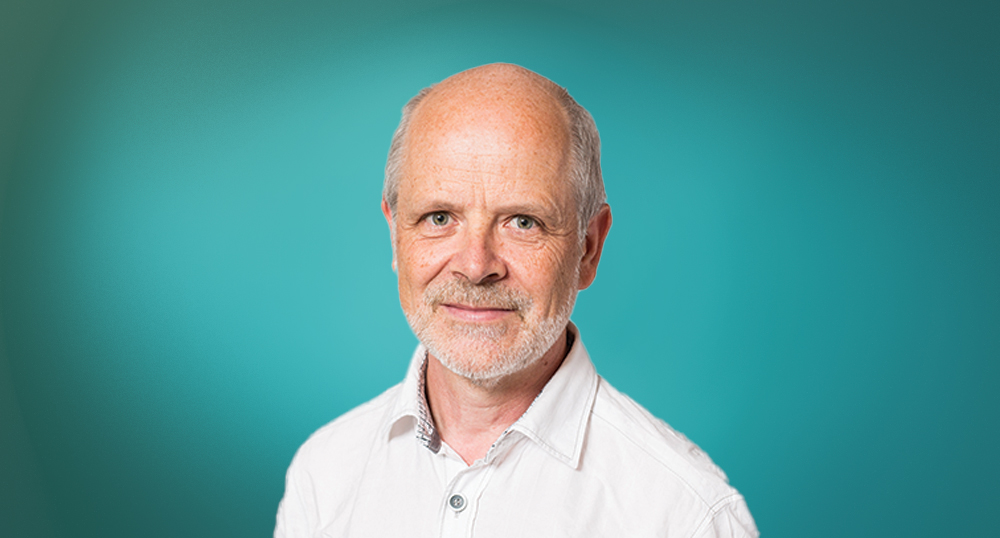MATH+ Distinguished Fellow Alexander Mielke (WIAS / HU Berlin)

MATH+ launched the MATH+ Distinguished Fellowship Program to recognize outstanding contributions to the mathematical sciences and to support the work of world-leading mathematicians in Berlin. We are delighted to introduce the next MATH+ Distinguished Fellow: Alexander Mielke. He is a Professor of Applied Analysis at Humboldt-Universität zu Berlin and Head of the research group “Partial Differential Equations” at the Weierstrass Institute for Applied Analysis and Stochastics (WIAS) in Berlin.
Alexander Mielke studied mathematics and physics at the Universität Stuttgart, where he received his PhD in 1984 on the topic “Stationary Solutions of the Euler Equation in Channels of Variable Depth“ and then went on to become a research associate there. From 1986 to 1987, he did research at Cornell University (New York). Back in Germany, Mielke received the Richard-von-Mises Prize from the Society for Applied Mathematics and Mechanics (GAMM) and the Heinz Maier-Leibnitz Prize for Applied Mathematics from the German Research Foundation (DFG) in 1989. He then habilitated at the Universität Stuttgart in 1990 on the topic of “Hamiltonian and Lagrangian flows on center manifolds with applications to elliptic variational problems” and was appointed professor at the Institute of Applied Mathematics at the Universität Hannover until 1992. This was followed by an appointment at the Institute for Analysis, Dynamics, and Modeling at the Universität Stuttgart in 1999.
Alexander Mielke accepted the full professor position at the Humboldt-Universität zu Berlin in 2004. Since then, he has also been the research group leader of the “Partial Differential Equations” group at the Weierstrass Institute for Applied Analysis and Stochastics (WIAS) in Berlin, where he served as Deputy Director since 2005. He joined the DFG Research Center Matheon at the same time and was a member of the Matheon Executive Board from 2009 to 2014.
He received the prestigious ERC Advanced Grant from 2011 until 2017 for the project AnaMultiScale (Analysis of Multiscale Systems Driven by Functionals, ERC FP7-267802).
Alexander Mielke is an active member of the Berlin Mathematical School (BMS) and the BMS Admissions Committee. In MATH+, he has been one of the Scientists in Charge of the Application Area (AA2) Materials, Light, and Devices and is currently also chair of the MATH+ Council.
When he learned about the MATH+ Distinguished Fellow award, he said:
“I was surprised and delighted to receive the MATH+ Distinguished Fellow award because MATH+ has become the most important part of my mathematical life, and this award highlights my research. I came to Berlin in 2004 because of the DFG Research Center Matheon. After MATH+ was established in January 2019, it opened up excellent opportunities for exchange and collaboration on research with applied mathematicians and other disciplines, such as in my case with theoretical and experimental physicists and, more recently, geodynamicists. For instance, within a recent MATH+ Incubator Project (with Thomas Koprucki/WIAS and the physics institutes PDI and IKZ), the MATH+ scientist Oliver Marquardt co-submitted an invention disclosure and patent examination of research results on a topic involving quantum dots. And finally, the prize money now allows me to launch two new research directions, dealing with the existence and stability of non-equilibrium steady states, including self-similar structures, and with gradient flows in material science.”
Alexander Mielke works in the field of nonlinear partial differential equations. He develops variational methods for problems in continuum mechanics and materials science, including the description of nonlinear elasticity, plasticity, thermal effects, and chemical reaction-diffusion systems. He is known for his work in finite-strain elastoplasticity and for developing the theory of rate-independent systems. His approach to multiscale models, such as homogenization or dimension reduction, is unique because of his tools for variational methods, which allowed him to define the new notion of EDP convergence of gradient systems.
Visit his personal homepage for more information.
——-
MATH+ Distinguished Fellowship Program
The MATH+ Distinguished Fellowship is bestowed upon individuals in recognition of outstanding contributions to the mathematical sciences in general. The program’s goal is to support the work of world-leading mathematicians, who hold permanent professorships at one of the MATH+ partner institutions, i.e. FU, HU, TU Berlin, WIAS, or ZIB. MATH+ provides Distinguished Fellows with a fellowship allowance for fostering innovative ideas and research activities, initiating exciting, vibrant research collaborations, and expanding the international research network and activities of the Fellows.
There are currently five MATH+ Distinguished Fellows: Gavril Farkas, Peter K. Friz, Michael Joswig, Bruno Klingler, and Alexander Mielke.
For international colleagues, MATH+ offers funding as (Distinguished) Visiting Scholars.

